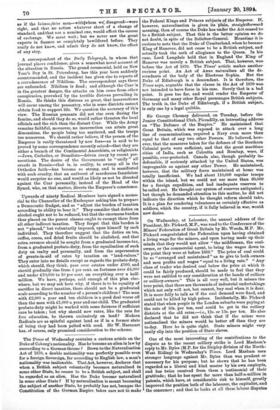The Times of Wednesday contains a curious article on the
Duke of Coburg's nationality. Has he become an alien in law by succeeding to a German throne ? Down to the Naturalisation Act of 1870, a double nationality was perfectly possible even for a foreign Sovereign, for according to English law, a man's nationality was inalienable. That Act, however, declares that when a British subject voluntarily becomes naturalised in some other State, he ceases to be a British subject, and shall be regarded as an alien. Has the Duke become naturalised in some other State ? If by naturalisation is meant becoming the subject of another State, he probably has not, because the Constitution of the German Empire takes care not to make
the Federal Kings and Princes subjects of the Emperor. If, however, naturalisation is given its plain, straightforward meaning, then of course the Duke has under the Act ceased to be a British subject. That this is the better opinion we do. not doubt, in spite of the Solicitor-General. Meantime it is curious to note that the Duke of Cumberland, when he became. King of Hanover, did not cease to be a British subject, and actually took the oath of allegiance to the Queen. In his case, Lord Langdale held that in England the King of' Hanover was merely a British subject. That, however, was before 'the Act of 1870. The Times' article makes another curious point. An Act of Anne naturalises all the de- scendants of the body of the Electress Sophia. But the' Duke of Edinburgh is a descendant. It is therefore, the. Times says, arguable that the clause in the Act of 1870 was not intended to have force in his case. Surely that is a bad point. It goes too far, and would render the Emperor of Germany and many other Royal personages British subjects.. The truth is, the Duke of Edinburgh, if a British subject,. is only one by a legal quibble.


































 Previous page
Previous page